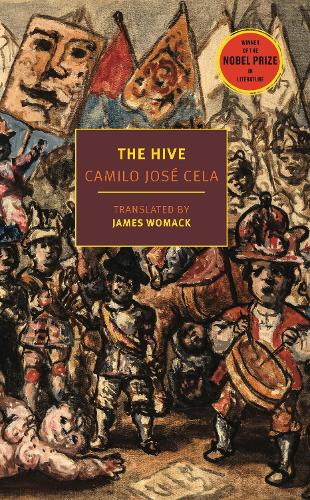
The Hive
(Paperback)
Publishing Details
The Hive
By (Author) Camilo Jos Cela
By (author) James Womack
New York Review Books
NYRB Classics
25th April 2023
23rd February 2023
United States
Classifications
General
Fiction
863.64
Physical Properties
Paperback
304
Width 127mm, Height 203mm
Description
Complete and uncensored in English for the very first time, a fragmented, daringly irreverent depiction of decadence and decay in Franco's Spain written by the 1989 winner of the Nobel Prize in Literature. The translator Anthony Kerrigan compared Camilo Jose Cela, the 1989 winner of the Nobel Prize in Literature, to Louis-Ferdinand Celine and Curzio Malaparte-all "ferocious writers, truculent, badly spoken, even foulmouthed." However provocative and disturbing, Cela's novels are also flat-out dazzling, their sentences as rigorous as they are riotous, lodging like knives in the reader's mind. Cela called himself a proponent of "uglyism," of "nothingism." But he has the knack, to quote another critic, Americo Castro, of deploying those "nothings and lacks" to construct beauty. The Hive is set over the course of a few days in the Madrid of 1943, not long after the end of the Spanish Civil War, when the regime of General Francisco Franco was at its most oppressive. The book includes more than three hundred characters whose comings and goings it tracks to hypnotic effect. Scabrous, scandalous, and profane, The Hive is a virtuosic group portrait of a wounded and sick society.
Reviews
"The Hive remains an inevitable monument in Spanish literature, an updated [Goya's] Disasters of War, whose vignettes revolve around the endurance of the Spanish character through the ravages of poverty and despotism. Adrian Nathan West, The New York Times Book Review
"There is a secret slot for Cela at his best, as lone of the great prose stylists, plural, of Spaina man dangerously like us."Roberto Bolao
"Cela is the Goya of Franco's Spain."Paul West
It is not to be wondered that the French censorship disapproves of Celas novels . . . his literary affiliations are of the most radical; they are with Camus and Sartre, with Moravia, with Zola and French naturalism. Saul Bellow
His best work . . . a carnivalesque reconstruction of the Spanish tradition, a nightmarish, surrealistic depiction of human endeavor. Julio Ortega
Author Bio
Camilo Jose Cela (1916-2002) won the Nobel Prize in Literature in 1989. Though he wrote prolifically and audaciously in a number of different genres, he is best known for his novel The Hive, which was published in Argentina in 1951 after being banned in Franco's Spain. In addition to his writing, he produced drawings and paintings and also appeared in several films. James Womack is a poet and a translator from Russian and Spanish. His most recent poetry collection, Homunculus, was published by the UK press Carcanet in 2020. His translations include Manuel Vilas's Heaven and a collection of poetry by Vladimir Mayakovsky.
